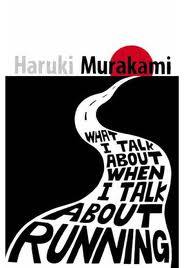Our book group choice for September 2008 is What I Talk About When I Talk About Running by Haruki Murakami. Equal parts training log, travelogue, and reminiscence, this revealing memoir covers his four-month preparation for the 2005 New York City Marathon and takes us to places ranging from Tokyo’s Jingu Gaien gardens, where he once shared the course with an Olympian, to the Charles River in Boston among young women who outpace him.
In What I Talk About When I Talk About Running, Haruki Murakami explores the intersection of running and writing, two of his lifelong passions. The book is part memoir, part philosophical treatise, and part training manual, as Murakami recounts his experiences running marathons and ultramarathons, as well as his thoughts on the nature of running, writing, and the creative process.
Murakami begins by discussing his early experiences with running. He started running in his early 30s, after he had closed his jazz bar and decided to focus on writing. He found that running helped him to clear his head and focus on his work. He also found that running was a way for him to challenge himself and to push his limits.
As Murakami’s running progressed, he began to compete in marathons and ultramarathons. He describes the training that he went through, the mental and physical challenges that he faced, and the sense of accomplishment that he felt when he crossed the finish line. He also discusses the importance of running in his life, both as a physical and a mental discipline.
In addition to his personal experiences, Murakami also writes about the philosophy of running. He discusses the different ways that people approach running, the different motivations that people have for running, and the benefits of running for both the body and the mind. He also talks about the relationship between running and writing, and how the two activities can complement each other.
What I Talk About When I Talk About Running is a thoughtful and insightful book that offers a unique perspective on the nature of running and writing.
Here are some of the key themes that Murakami explores in What I Talk About When I Talk About Running:
- The importance of discipline and hard work. Murakami believes that running is a metaphor for life, and that the discipline and hard work required to run a marathon are essential for success in any field. He writes, “Running is a question of how much you’re willing to suffer.”
- The power of the mind. Murakami argues that the mind is often the biggest obstacle to running, and that it is important to learn how to control your thoughts and emotions. He writes, “The mind is the most important muscle in running.”
- The importance of finding your own pace. Murakami believes that it is important to find a pace that is right for you, and that you should not compare yourself to other runners. He writes, “There is no such thing as a perfect pace. The only perfect pace is your own.”
- The joy of running. Despite the challenges of running, Murakami ultimately finds it to be a joyful experience. He writes, “Running is a form of meditation for me. It’s a way to clear my head and focus on the present moment.”
Discussion Questions
- What are the similarities and differences between running and writing, as Murakami experiences them?
- How does Murakami’s running practice help him to be a better writer?
- What does Murakami mean when he says that “pain is inevitable, suffering is optional”?
- What are the benefits of running for mental and emotional health?
- What are the challenges of running long distances?
- How does Murakami deal with the boredom and monotony of long runs?
- What are the different ways that Murakami uses running to explore his own identity?
- What is the role of music in Murakami’s running practice?
- What does Murakami mean when he says that “running is a metaphor for life”?
- What are the lessons that Murakami has learned from running?
- How does Murakami’s running practice connect him to the natural world?
- What are the social and cultural aspects of running?
- What are the different ways that running can be used for self-expression?
- What are the ethical implications of running?
- What is the future of running?

